Firework alternatives
Fireworks are a popular choice for celebrations, however they can be harmful to animals. If you'd like to be more animal friendly, consider attending other events or hosting your own.
Be kind to animals with low noise fireworks alternatives
As animals have incredibly sensitive hearing, fireworks can cause stress, injury and even death.
If you're planning on letting off fireworks in your garden or at a public display, read our low noise fireworks alternatives guide for animal-friendly options that are quieter, less frightening and equally as spectacular.

The impact of fireworks on animals
Fireworks don’t just startle or scare animals; sometimes they cause severe damage to their mental and physical well-being.
In a 2025 fireworks poll conducted by Savanta, over 1,300 UK pet owners were asked if their pets, or animals, had ever been negatively affected by traditional loud fireworks – and 62% of them said they had.
Our own 2024 impact survey report showed that 38% of pet owners consulted their vet for support, medicine or prescribed relief during the fireworks season.
From emotional distress to actual pain and suffering, traditionally loud, often explosive-sounding fireworks may only be an evening long, but the effects can be lasting.
Quiet and low noise fireworks alternatives
The desire for quiet fireworks and alternatives is growing. Over 90% of Brits want alternatives to fireworks – things like lasers, drones, or silent/quiet fireworks. These alternatives are available for both public and private displays.
Though there are no truly silent fireworks, these low noise alternatives can reduce the impact and fear felt by both people and animals that traditional fireworks often cause.
If you’re planning a display, explore these options to celebrate safely and respectfully.
See how many animals are affected in your area with our RSPCA fireworks map.
Making firework displays less scary for pets
Find and share our infographic on reducing the impact of fireworks on animals – and spread the word!
Drones and light displays
Fireworks are no longer the only sought after option. Over 60% of people think fireworks alternatives would be just as fun to watch as traditional fireworks – rising to 66% for those who have actually attended displays with alternatives used.
The people want them. The animals need them. Now we must use them.
While these alternatives can still have a negative impact on animals – drones aren’t totally silent and laser and light shows still cause bright flashes – on balance, they are better for animal welfare than traditional fireworks.
Drone displays
Drones are the most commonly used alternative to fireworks. In these displays, illuminated drones swoop and swarm in the night sky to make mesmerising patterns and images. Practically anything is possible with drones – they’re a way to let your imagination run wild without the worry of your pet’s welfare weighing on your mind.
Though they’re not 100% silent, they’re a much quieter and less frightening way of celebrating – however, organisers of drone displays will still need to consider their location, so they don’t negatively impact animal wellbeing.
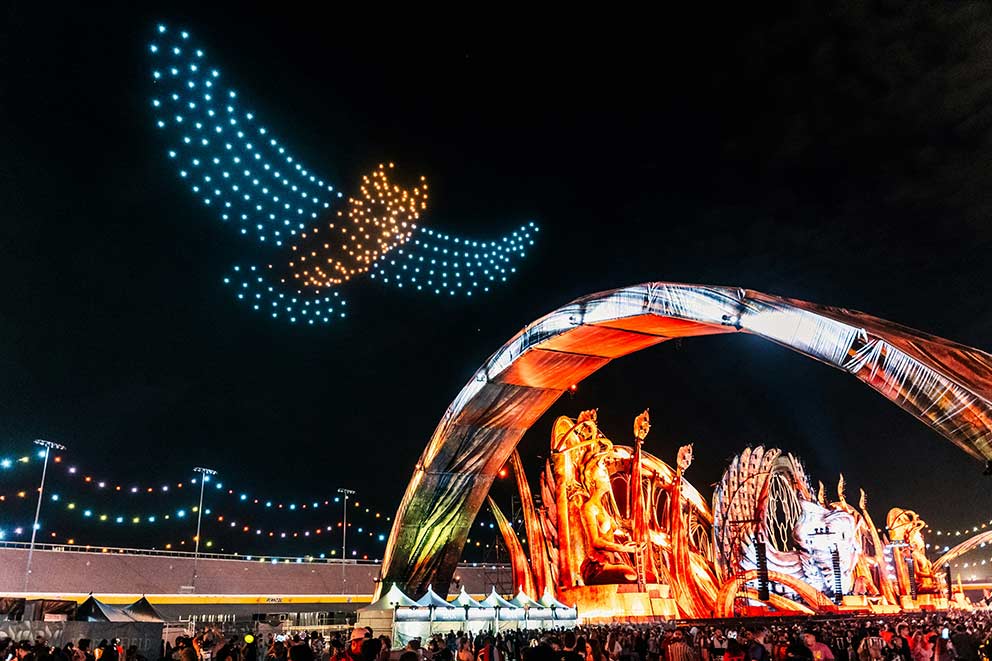
Light shows
Laser and light shows are also popular alternatives. The experience is similar to a fireworks display, with a dedicated viewing area set up as the lasers or LEDs light up the sky in an array of enchanting patterns. Though these light shows can still create bright flashes that might startle animals, they’re a much safer alternative to the loud bangs and jump scares of fireworks. More ‘light show’ less ‘fright show.’
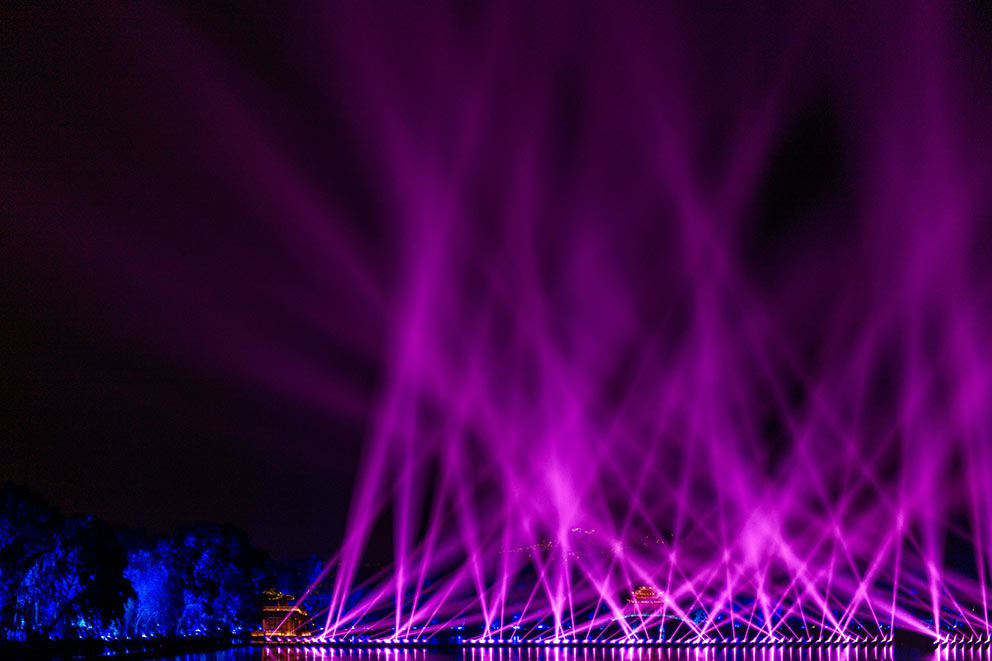
Change won’t happen overnight, but we have seen that lower-noise fireworks are an incremental improvement that reduces animal stress compared with the alternative.
66% of respondents to our 2024 impact reporting survey told us that backyard firework displays are a major concern
Meet two animals severely frightened by fireworks
Public firework and light displays
If you still want to enjoy fireworks events, the best option is to attend a public display, rather than having a private one in your own garden. There are many benefits of public displays:
- They reduce the number of fireworks disturbing animals: There are fewer fireworks let off in gardens, as you’ve gathered together in one place to watch one display.
- They remove the unpredictability of private displays: At a public event, you often know exactly when the fireworks will be set off, and how long for, meaning pet owners and farmers are better able to prepare in advance.
- They’re an opportunity to gather together as a community: It’s better for the animals and also for the people.
For the fireworks event organiser
If you’re a fireworks event organiser (or, if you know the person who is, please share this page) here’s our advice on organising the best, safest and kindest event:
- Host the display away from livestock: Choose a spot away from livestock, horses and land used to rear or keep animals.
- Choose low noise alternatives: Drones, light shows or quiet fireworks are equally as enjoyable, but much gentler on animal hearing.
- Alert those living nearby and the local community about the upcoming event: This helps people with pets or owners of livestock to prepare in advance.
- Check for animals on the land: Wherever the event will take place, check for farmed animals, horses or wildlife that might be grazing nearby, and inform the owners.
- Choose a location away from known habitats: Such as lakes with waterfowl and trees with roosting birds.
- Check bonfires for wildlife before lighting them: Animals, such as hedgehogs, might be sheltering inside.
- Pick up firework litter after it’s cooled: Make sure to dispose of used, misfired or unwanted fireworks safely, as they can harm nearby animals. To do this, submerge the fireworks in water for 48 hours, then put them in a bag and throw them in a bin.
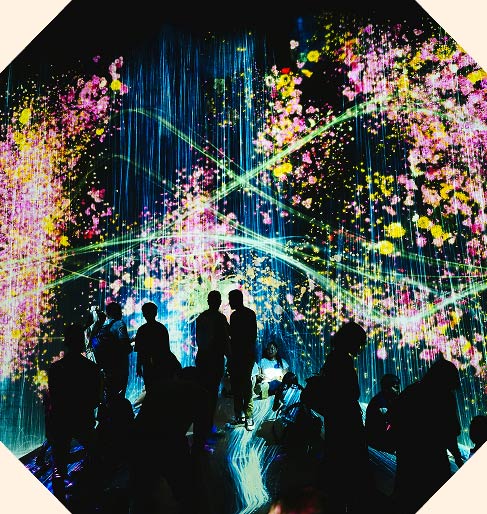
Private fireworks and light displays
Over a third of Brits went to or hosted a private fireworks display, such as those held in back gardens, in 2024. Current firework regulations don’t apply to private displays, making them more unpredictable and harder to control.
We’re campaigning to see these laws reformed to protect our pets, wildlife and farm animals. But until there are laws in place, you can still take your own steps to prepare neighbours and protect their animals – here’s how:
- Inform your neighbours: Let your neighbours know your firework plans in advance, so they can prepare and make necessary arrangements.
- Stick to tradition: Stick to the traditional dates (Diwali, Bonfire Night, New Year’s Eve and Chinese New Year) to help eliminate surprise.
- Finish early: Avoiding late hours is more considerate to both animals and vulnerable people – keep it short and sweet.
- Use low noise fireworks: There are lots of new, quieter options which still make a bang but without as big a flash.
- Have a silent display: Replacing your bangers with drones or light shows is less frightening and equally mesmerising.
- Check bonfires for wildlife before lighting them: Animals, such as hedgehogs, might be sheltering inside.
- Pick up firework litter after it’s cooled: Make sure to dispose of used, misfired or unwanted fireworks safely, as they can harm nearby animals. To do this, submerge the fireworks in water for 48 hours, then put them in a bag and throw them in a bin.
- Attend an organised public display instead: It’s always kinder to choose public events, rather than hosting your own at home.
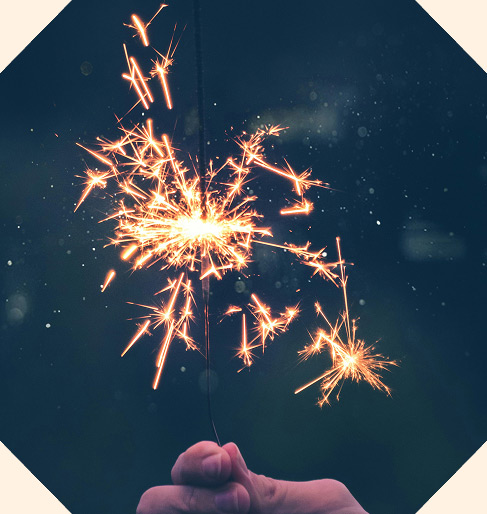
How to talk to your neighbours about fireworks displays
If you’re hosting a fireworks event at home
Thinking about having fireworks at home? First, check if there’s a local public display you could attend instead. If you still want to go ahead, talk to your neighbours beforehand – especially those with pets and livestock owners in your community.
The noise from your display won’t be contained to your garden, and will impact all those within a nearby radius. By sharing your plans, they’ll be able to prepare, to help keep their animals safe, or speak up about their concerns.
However, we understand that it’s not always an easy subject to broach. Psychologist, Jess Baker, offers simple advice on how to talk to your neighbours about your firework plans:
- Remember that sound travels: Consider the people around your home and make a list of who could be affected by your fireworks.
- Give them plenty of notice: Don’t wait until the evening that you plan to set off fireworks to let your neighbours know. Speak to them a couple of weeks in advance, so they have time to prepare and make arrangements for their animals if needed.
- Speak to your neighbours in person: If you feel comfortable doing so, you could knock on a neighbour’s door. It might be awkward at first, but making eye contact is crucial for maintaining trust between you. And, unlike a text, a face-to-face conversation will help avoid misinterpretation.
- Give them as much information as possible: Give them details on the time and how long you expect the fireworks to last.
- Be prepared to compromise: If your neighbour has hesitations about your plans, consider possible compromises you could take to make them feel more at ease. For example, setting them off earlier in the evening rather than late at night, or attending a public event rather than hosting your own. Offer some suggestions and try to find a solution together.
If you’re unsure about whether or not to have fireworks in your garden, consider: is a loud evening display really worth potentially irreversible distress and harm done to animals?
If your neighbours are hosting a fireworks event
If your neighbour is planning a private fireworks display – or there’s a public event near to where you live – and you’re worried about your pets, horses, livestock or nearby wildlife, speak up on their behalf:
- Let them know about any anxious animals: They may be open to alternatives, like early displays or low noise substitutes, or happy to cancel it entirely. But if they don’t know about your animals, they can’t help to ease the situation.
- Alert them to the presence of your animals: If you’re a farmer or have outdoor animals, let your neighbours or local community event organiser know that your animals are around, so they’re aware when making their plans.
If there’s a firework event taking place near to you, and you’re unsure how to help keep your pets, livestock, or wildlife safe, explore our firework advice below.
Related content
1 - Of over 1300 UK adults in the Savanta 2025 fireworks poll
2 - Of pet owners in our 2024 Impact Survey Report
3 - Of over 2000 UK adults in the Savanta 2025 fireworks poll, when asked if they would choose low-noise fireworks instead of traditional loud fireworks
Light displays
Go for light displays that can create a similar visual spectacle as fireworks. LED light installations, drone displays, and even laser light shows can still fill the night sky with vibrant colours, but without the loud noises that unsettle our animals.
When considering alternatives like lasers, remember the sensitivity of light and noise for animals. Protect livestock and horses from distress caused by sudden or continuous flashes of light or drone sounds.
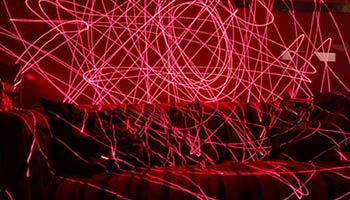
Music events
Live music performances or outdoor concerts are a great way to celebrate special events. It can create a joyful and festive atmosphere, bringing people together and avoiding the sudden noises that frighten animals.

Nature and wildlife events
Embrace nature and the great outdoors by organising wildlife-themed events or nature walks during the evening.
Explore and appreciate the beauty of nature and experience nocturnal wildlife in a peaceful and respectful manner.

Community gatherings
Organise community gatherings to celebrate together with neighbours and loved ones. These gatherings can include activities such as games and bonfires. If having a bonfire, make sure you check that no animals are hiding in it before lighting.
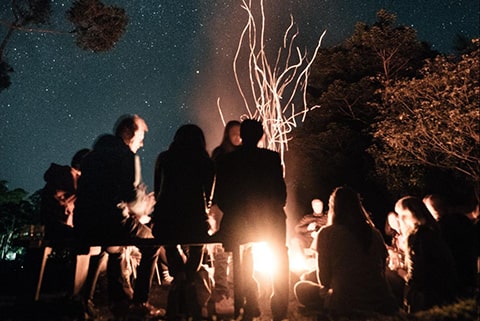
Lantern parades
Lantern parades involve fixed lanterns, eliminating the risks associated with sky lanterns. Unlike sky lanterns, which are released into the sky using an open flame, fixed lanterns are lit by LEDs and are safely secured to the floor or carrying poles and do not pose a fire hazard or risk to wildlife.
These parades get more popular during the winter months and are usually accessible to all. It's good for children and young people who often get to hold the lights in their hands and see them up close.
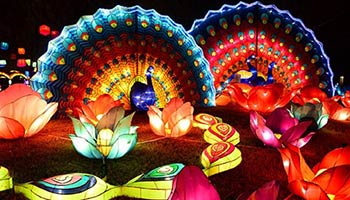
Virtual events
Technology has made it easy to use virtual celebrations. Virtual games, video calls, live streams and online events can be just as engaging and memorable. It's ideal for people who live far apart and allows them to connect where they might not be able to.









